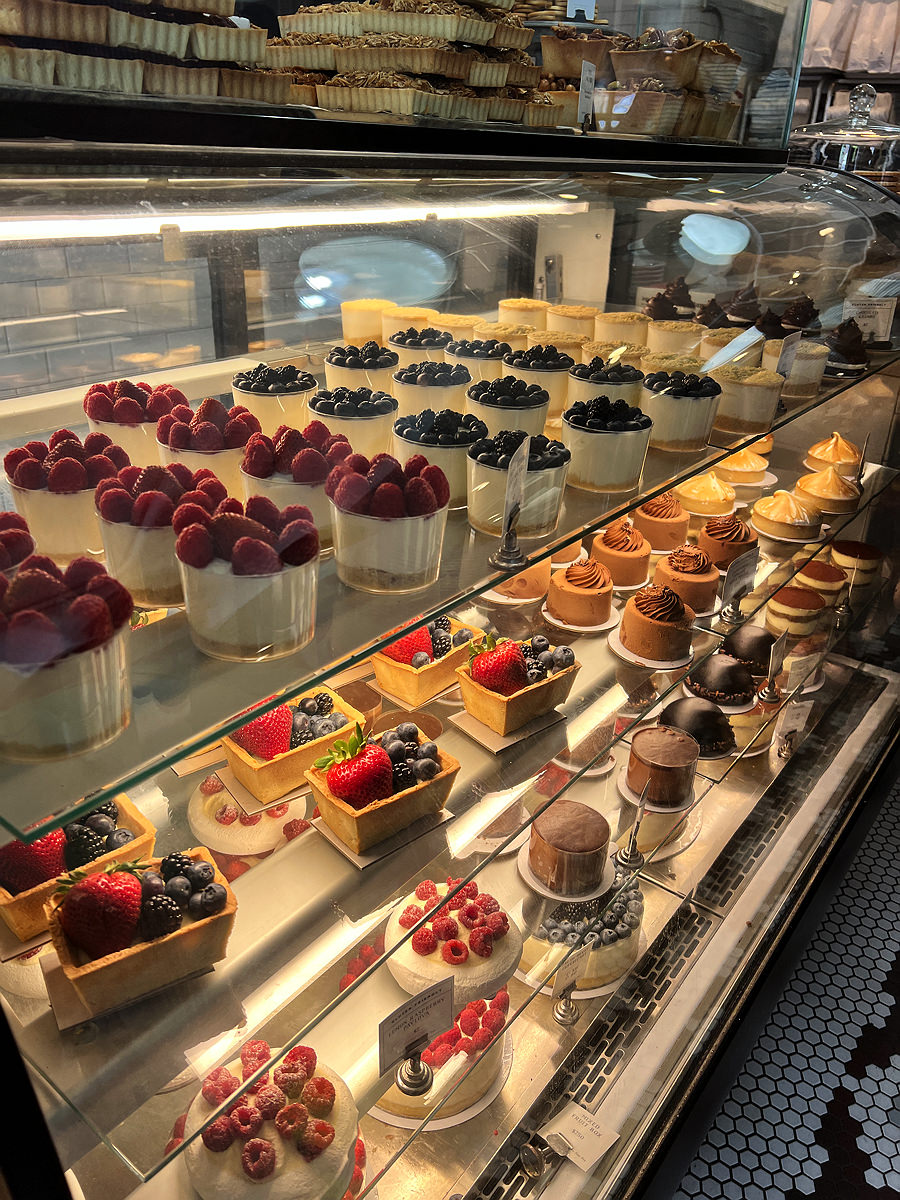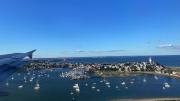There’s something otherworldly about watching a plane land at Boston Logan Airport. The wheels graze the coast of Boston, mere inches from the cobalt Atlantic Ocean, threatening to touch the waves before brushing the tarmac. In daylight, the blood-orange sunbeams bounce off the water. The plane growls to a halt.
When I touched down in Boston last week, I witnessed the spectacle of a plane landing with the same bug-eyed wonder that captivated me five years ago, when I flew in for Visitas, Harvard’s admitted students’ weekend. This time, I’m in town for the University’s belated in-person Commencement ceremony for the classes of 2020 and 2021.
The two trips bookend my college experience—Visitas was an alluring preview of undergraduate life; this visit, a poignant reflection on its highlights. I traveled internationally from the United Kingdom, where for the past nine months I have been a master’s student in English studies. It was my first time in America since January, when I briefly went home to Arizona for winter break.
I arrived a week before graduation to recover from jet lag and catch up with friends and mentors in the Boston area, some of whom I hadn’t seen since prior to the pandemic. I split the week between living in a graduating senior friend’s Kirkland House suite and another friend’s apartment in Brookline. Staying in the Kirkland spare room was surprisingly comfortable, evocative of my undergraduate years, as my friend and her roommates invited me to join 2 a.m. conversations in their common room while munching on microwaveable mac-and-cheese softened by boiling water from a kettle.
But in Brookline, I was reminded of how much can change in a year. My friend and her roommates there all work full-time jobs after graduating from college last spring. Their fully-stocked kitchen and early weeknight bedtimes were reminders that adulthood, seemingly distant when viewed through the Dionysian fog of college, comes hurling like a meteor. As a graduate student, I have existed in the liminal space between the two extremes: no longer an undergraduate and not yet a member of the workforce, I’ve maintained the flexibility of a student, albeit with more responsibilities.
This week, I decided, would be a mini-vacation leading up to Commencement. I hoped to re-experience some of my favorite parts of Harvard, including my favorite restaurants and cafés in the Square. I craved the snacks I’d been denied while living in the U.K.: barbecue-flavored potato chips, buttermilk ranch dip, and quality nachos, among other American favorites I had raved about to my British friends. As I floated between cafés each morning, sipping iced chai lattes from Tatte, Flour, and Black Sheep, I eagerly planned my next meals with friends, anticipating a week of gastronomical delights.
On Tuesday evening, I watched Everything Everywhere All at Once with a college friend at Apple Cinemas—a movie theater in Fresh Pond I used to frequent as an undergraduate for its discount films and cheesy powdered popcorn. The movie grapples with the multiverse, a concept that has seen a recent revival in science fiction and proposes the existence of simultaneous parallel universes. In the film, each hypothetical universe explores decisions not made and roads not taken, and their consequences in the protagonist Evelyn’s life. In some universes, Evelyn is rich and famous, and in others, she has hot dogs for fingers—a range of outcomes produced by infinitesimal changes in the arc of the universe and her own decisions.
After seeing the film, I began to consider the multiverse in the context of my own Harvard experience. What would have happened if I had made different choices in college? Where— more importantly, who—would I be now? I pondered how the dynamics of my social circles would have shifted had I never attended a pre-orientation program or had I sat with different students during my first Annenberg meal. I considered the consequences of accepting invitations to club info sessions and “comp” meetings that I had in reality chosen to turn down. I reflected on the beginning of each semester, when I was inevitably torn between two classes and forced to pick only one.
What would have happened had I chosen the class on American horror fiction instead of Gilded Age literature, attended the satire magazine info session as opposed to the political review comp meeting, or sat next to a stranger in Annenberg instead of relying on the company of my pre-orientation friends? Which hypothetical version of myself—and which universe—might I inhabit today?
In some ways, my fellow alumni and I are all evolved iterations of the same main character: the first-year who faces an abundance of possibilities upon passing through one of Harvard Yard’s many gates. But like the reluctant protagonist in Everything Everywhere All at Once, we must ultimately choose among our options and grapple with the consequences, for better or for worse. As I return to Harvard one year after graduating and enrolling in a new university on a different continent, it’s difficult to imagine a universe—let alone multiple universes—in which I’d never made the decisions that shaped the trajectory of my undergraduate years and led to my current path. The multiverse reminds me these parallel worlds, however improbable, are nevertheless conceivable, buried somewhere in the folds of my subconscious.
On Friday, I noticed alumni from the classes of 2020 and 2021 begin to trickle in with their families. Between running into former classmates on the street and texting close friends to see if they’d arrived yet, I felt the Square bubble with a buoyant energy I hadn’t felt among my peers since before the pandemic began. Friends I hadn’t seen in years messaged me asking if I was planning to attend the slate of weekend events Harvard had organized for recent graduates and their guests. I wish I’d become closer to some of these friends in college, and couldn’t help wondering what would’ve happened had I spent more time with them earlier on or kept in touch more consistently after graduating. I considered the parallel universe it would have unlocked.

Pastries on display at Tatte Bakery, a stop on the author's food tour of Harvard Square this week
Photograph by Meena Venkataramanan
As I gallivanted around Harvard Square with close friends this past week on my carefully curated food tour, I reflected on the chance encounters that led to these long-term friendships and the split-second decisions that radically altered the course of my undergraduate years. Commencement this weekend feels more like a premature reunion than a graduation: an opportunity to take stock of the past five or six years and reacquaint myself with the people and places that made Harvard feel less unfamiliar.
On first-year move-in day, my family and I had lunch at Cardullo’s, a bodega near the Harvard T stop. Like countless other Square establishments I would pass without a second thought as an undergraduate, Cardullo’s quickly faded into the woodwork. I didn’t make another visit there until my senior spring.
But in a moment of nostalgia this week, I suggested to a friend that we grab sandwiches from Cardullo’s and eat them along the Charles River. It was an attempt at reliving my senior spring, when I’d often eat meals outdoors because of pandemic dining restrictions. But even more so, it was an attempt to evoke my first year at Harvard, inaugurated by a hasty move-in lunch at Cardullo’s with my family. Where we ate that day now seems inconsequential, but the multiverse reminds me of the interconnected nature of events and non-events alike, the way they crash into each other like the waves in Boston Harbor, setting into motion a ripple effect only perceptible in retrospect.









